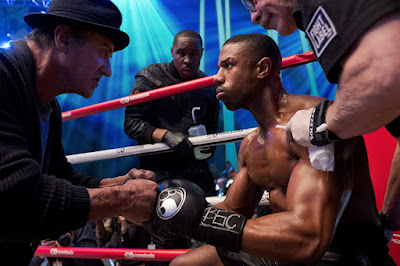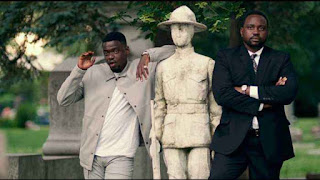THE LITTLE STRANGER
(UK/Ireland - 2018)
Buried at the end of summer and released with little publicity, the gothic ghost story THE LITTLE STRANGER was a huge flop, opening in 23rd place and grossing $713,000 on just under 500 screens. Based on the 2009 novel by Sarah Waters and adapted by Lucinda Coxon (THE DANISH GIRL), the film was a momentum-killer for Oscar-nominated ROOM director Lenny Abrahamson, and while it succeeds in atmosphere with impeccable production design and a memorably foreboding haunted house, it's ultimately a chiller too distant and stand-offish for its own good. The house in question is Hundreds Hall, the home of the once-prominent Ayres family. But it's the late 1940s and the mansion and the family have seen better days. Scion Roderick (Will Poulter) is severely burn-scarred, disabled, and shell-shocked following his WWII heroics in the RAF, his mother Mrs. Ayres (Charlotte Rampling) still mourns the childhood death of her first-born daughter Susan, nicknamed "Suki," and other daughter Caroline (Ruth Wilson) is a spinster trying to hold what's left of her family together. Much of Hundreds Hall is closed off and they're down to one servant in clumsy teenager Betty (Liv Hill). It's Betty's bout with a cold that brings mild-mannered Dr. Faraday (Domhnall Gleeson) into their lives and begins a series of events that Roderick believes is being caused by a malevolent spirit residing in the house. Caroline's docile dog suddenly mauls a little girl with no provocation, Mrs. Ayres finds scribbling on a closet wall that seems to spell out "Suki," and an increasingly agitated Roderick sets fire to his room in an attempted suicidal self-immolation and is promptly carted off to an insane asylum. All the while, the perpetually gloomy Faraday grows fond of Caroline and starts aggressively pushing the idea of marriage, and is also dealing with his own issues that stem from a traumatic childhood visit to Hundreds Hall with his mother, who was once part of the servant staff.
There's some intriguing elements to THE LITTLE STRANGER, but the pace is so oppressively glacial that even fans of slow-burn horror will find it to be a patience-tester (Wilson has experience with this style, having starred in I AM THE PRETTY THING THAT LIVES IN THE HOUSE, the absolute slowest of all horror slow-burners). Abrahamson captures a mood of sustained dread, but he's so focused on that aspect that with the exception of one well-done sequence where Mrs. Ayers encounters something in an empty room, the scares never come and all you're left with is a frustratingly ambiguous final shot that's more likely to provoke dismissal than discussion. Well-intentioned and well-acted (Rampling is, as always, a treasure who elevates everything she's in), but this is a meandering, ponderous bore. (R, 112 mins)
COLD SKIN
(Spain/France - 2018)
Based on a novel by Albert Sanchez Pinol, the somewhat Lovecraftian COLD SKIN feels a lot like a throwback to those circa 2000-2003 Spanish-made Filmax/Fantastic Factory/Brian Yuzna productions. There's a definite DAGON influence here with its aquatic creatures and even some Stuart Gordon-like sexual transgression, and though French filmmaker Xavier Gens conveys it through sounds and implication, that artistic decision doesn't make it any less unsettling. Gens hasn't really lived up the promise of his 2007 feature debut FRONTIER(S), his contribution to the "New French Extreme" explosion from a decade and change ago. He had a miserable experience going Hollywood with HITMAN and while 2011's ultra-grim THE DIVIDE has some defenders, it's little more than an exploitative, post-apocalyptic SALO, or THE LAST BOMB SHELTER ON THE LEFT. He did some hired gun TV work before returning to the horror genre with 2017's barely-released and instantly-forgotten THE CRUCIFIXION, arguably the most pointless modern-era EXORCIST knockoff this side of THE VATICAN TAPES. Though not without its flaws and budgetary shortcomings, the ambitious and often surprisingly thoughtful COLD SKIN is Gens' best film since FRONTIER(S) simply by virtue of it not being awful. That said, things get off to a shaky start with that oft-used Nietzsche quote about gazing into the abyss and it gazing back at you, which at this point is pretty much the screenwriting equivalent of walking into a Guitar Center and showing off by playing the intro to "Stairway to Heaven."
Set in late 1914 just as the world is heading toward war, a nameless meteorologist (David Oakes) is set to spend a year in voluntary "solitude-like exile" by manning the weather outpost on an isolated island near the Antarctic Circle. It's a job no one really wants unless they want to be alone (even the boat captain dropping him off asks "What are you running from?"), and the island's only other inhabitant is Gruner (Ray Stevenson, who stepped in when Stellan Skarsgard bailed during pre-production), the drunken and grizzled-bordering-on-feral lighthouse keeper, who informs him that his predecessor died not long after arriving a year earlier. Hunkered down for a year of cataloging wind and weather patterns, the meteorologist, dubbed "Friend" by Gruner, is in for a rude awakening when his cabin is attacked on the first night by a horde of amphibious creatures--resembling a cross-breeding of Voldemort with the Crawlers from THE DESCENT--who emerge from the water and only attack at night. The cabin catches fire and burns down, forcing Friend to find refuge at the lighthouse--somewhat fortified by spikes and makeshift barriers that merely slow the creatures down rather than keep them out--with Gruner. Friend also finds another surprise: Gruner has captured one of the female creatures, Aneris (Aura Garrido), and uses her as a sex slave. Friend and Gruner tentatively agree to share the lighthouse, forced to team up every night to fight off the persistent creatures as Gruner goes increasingly off the rails, especially once Friend starts treating the frightened Aneris with dignity and compassion. Given his past work, Gens is surprisingly restrained here, especially considering a key plot point being the sexual abuse of Aneris by Gruner. The creatures are an inconsistent mix of practical makeup and CGI, and the greenscreen work is occasionally shoddy, sometimes taking you out of the scene with a sense of artifice that doesn't appear to be by design. The attacking creatures storm the lighthouse in a very WORLD WAR Z fashion that's a little wonky and cartoonish, but there's some creepily effective moments throughout, particularly when Friend finds the dead meteorologist's notebook filled with sketches of a violent and sexual nature, with random scribblings like "Darwin was wrong." Stevenson is very good in a performance that grows unexpectedly complex as the film goes on, and Gens pulls off a few nice effects-aided technical shots, like a slow pan across the beach that takes the story from summer to winter. COLD SKIN needed a bigger budget to realize its full potential, but after a decade of floundering, this is Gens' most accomplished work since FRONTIER(S). (Unrated, 107 mins)











































